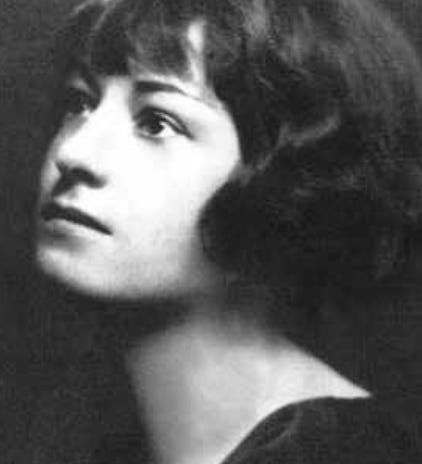TWA for Monday, August 22, 2016
“At the Church Door” by Louis Simpson from The Owner of the House. © BOA Editions, Ltd., 2003.
ORIGINAL TEXT AND AUDIO - 2016
Today is the birthday of writer and wit Dorothy Parker, born Dorothy Rothschild in Long Branch, New Jersey (1893). She went to a Catholic elementary school, but she was asked to leave after she referred to the Immaculate Conception as “spontaneous combustion.” Her formal education ended at age 14, and she played piano at a dancing school to earn a living while she wrote poetry. She sold her first poem to Vanity Fair in 1914, and she got offered a job as an editorial assistant for Vogue, which was owned by the same company. Two years later, she became a theater critic at Vanity Fair, and her witty reviews (which were often in the form of poems) made her very popular with readers. But in 1920 she was terminated because she offended powerful producers too often. Parker continued to write — book reviews for The New Yorker, short stories, and poems — and in the 1920s alone she published over 300 poems in magazines. Her books of poems include Enough Rope (1926) and Death and Taxes (1931). She also wrote screenplays with her husband, Alan Campbell, who she divorced in 1947 and remarried three years later. When she died in 1967, she bequeathed her entire estate to Dr. Martin Luther King Jr.
She said, “That would be a good thing for them to cut on my tombstone: Wherever she went, including here, it was against her better judgment.”
It’s the birthday of American novelist Annie Proulx (1935), who won the Pulitzer Prize for her second novel, The Shipping News (1993).
Proulx was born Edna Ann Proulx in Norwich, Connecticut. Her father’s family had come to the U.S. from Quebec. Both her parents valued fresh air and exercise, and Proulx spent her childhood traipsing outside and reading, especially science fiction and books by Marjorie Kinnan Rawlings. As an adolescent, she was devoted to William Faulkner, S.J. Perelman, and Dante. She said, “Almost every book I’ve read has left its mark.”
She attended Colby College briefly, but left to get married. She had children and later returned to college, earning a B.A. from the University of Vermont (1969), but she dropped out of a Ph.D. program after realizing she wasn’t fit for the academic life. She said: “I’m not a person who works well with others. Having to get along with people you don’t respect very much, having to deal with a bureaucracy, just the whole weight of idiots turned me off.”
Proulx divorced her husband and raised three sons as a single mother, earning money by writing how-to books like Sweet & Hard Cider: Making It, Using It, and Enjoying It (1984) and The Fine Art of Salad Gardening (1985). She was also writing short stories about rural life that often involved hunting and fishing, which she sold to magazines like Gray’s Sporting Journal and Esquire. She even traded one story for a canoe when the magazine didn’t have enough to pay her. When asked about the start to her writing career, Proulx said: “I only backed into it in order to make a living. And then I discovered that I could actually do it.”
Her first story collection, Heart Songs and Other Stories, was published in 1988. She wrote mostly about rural life and the men who worked farms, mills, and oil rigs. Her writing style was spare and poetic. She once described a female character as “thin as a folded dollar bill, her hand as narrow and cold as a trout.”
Proulx was 56 years old when her first novel, Postcards (1992), was published to great acclaim. She was living in Newfoundland at the time and working on what would become her second novel, The Shipping News (1993), about a sad man named Quoyle who moves to a small fishing village in Newfoundland. The novel wasn’t hard to write. She says, “I wrote that one because I was madly in love with Newfoundland, so for me it was a joy.” Proulx was inspired to write the book after finding an old copy of The Ashley Book of Knots (1944) at a yard sale. She bought it for a dollar and was fascinated by the illustrations and quotes, which she ended up using for chapter headings in the book. The Shipping News won the Pulitzer Prize for fiction and was a best-seller. It was made into a film in (1992), as was her short story Brokeback Mountain (1997), about two cowboys who fall in love and experience homophobia. Her success enabled Proulx to buy a 640-acre farm in Wyoming called Bird Cloud, where she lived for several years.
Proulx’s books often detail the labors and history of rural work like fur trapping and hog farming. She researches on the internet and also likes to drive and take long walks when she’s working out a scene. When she’s finishing a project, she works 16 hours a day.
Proulx’s books include At Close Range: Wyoming Stories (1999), Accordion Crimes (1996), and That Old Ace in the Hole (2002).
Annie Proulx is now 80 years old. She calls herself “bossy, impatient, reclusively shy, short-tempered, single-minded.” Her newest novel, which took her 10 years to write, is Barkskins (2016), a 700-page novel about capitalism and deforestation that begins in the 17th century. On writing, she says: “You should write because you love the shape of stories and sentences and the creation of different worlds on a page. Writing comes from reading, and reading is the finest teacher of how to write.”
It’s the birthday of science fiction and fantasy writer Ray Bradbury, born in 1920 in Waukegan, Illinois. He spent a lot of his childhood in the Waukegan library, where he fell in love with L. Frank Baum, Jules Verne, and H.G. Wells. One summer he went to see a local carnival act named Mr. Electrico, a man who sat in an electrical chair and knighted audience members with a sword while electricity flowed through his body. When he reached Bradbury, he put the sword on his head and shouted at him, “Live Forever!” Bradbury couldn’t get that out of his head, and the next day he made his father drive him to the carnival again, even though his uncle had just died and he was supposed to be at the wake. Mr. Electrico introduced the boy to all the carnival performers and then sat with him on a sand dune and told Bradbury that the boy was the reincarnation of Mr. Electrico’s best friend, a man who had died in his arms during World War I. Ray Bradbury said that Mr. Electrico “gave me a future and in doing so, gave me a past.” The next day his family moved cross-country, and as soon as they got to their new house, Ray Bradbury got out a piece of butcher paper and started to write. That was 1932, when Bradbury was 12 years old, and he said that he wrote every single day of his life from then on. His books include The Martian Chronicles (1950), Fahrenheit 451 (1953), and Farewell Summer (2006).
Ray Bradbury, who said: “There are worse crimes than burning books. One of them is not reading them.”
And: “I don't try to describe the future. I try to prevent it.”
And: “Go to the edge of the cliff and jump off. Build your wings on the way down.”
Be well, do good work, and keep in touch.®
Check out The Writer’s Almanac Pop Socket for $15.00 CLICK HERE





